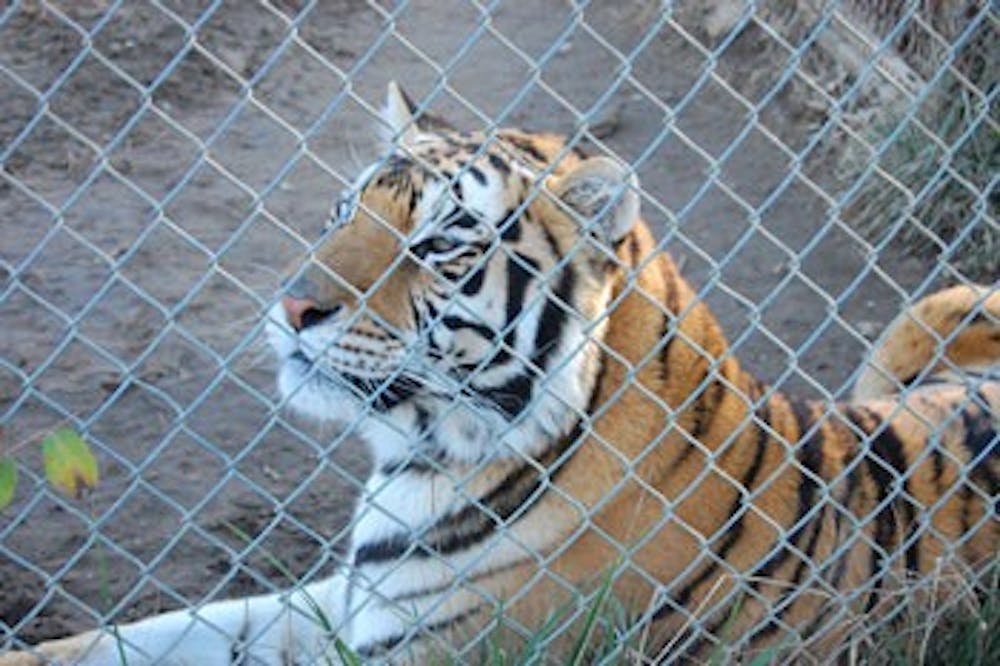“One day, we just caved and started watching it,” she said. “And it's pretty short, so we finished it in like two days.”
But not everyone in the Orange County community thinks “Tiger King” tells the whole story.
Carolina Tiger Rescue, located 17 miles south of UNC's campus, posted a statement on April 3 in response to the show’s popularity. CTR called the docuseries “sensationalized.”
"While we are glad that the issue of captive big cats in the U.S. is currently at the forefront of popular culture, we would like to refocus the conversation toward the problem rather than the story," Carolina Tiger Rescue said in the statement.
The post included an infographic entitled “What Tiger King Doesn't Tell You: 10 Things You Need to Know about Captive Big Cats.” The organization attributed the information to a document provided by Big Cat Sanctuary Alliance — which comprises Carolina Tiger Rescue as well as Big Cat Rescue, founded by Carole Baskin, one of the figures of "Tiger King."
In the list Carolina Tiger Rescue shared, Big Cat Sanctuary Alliance condemned the practice of "cub petting," or allowing the public to hold, pet and take photos with cubs. Cub petting is one of the main attractions at Greater Wynnewood Animal Park, a facility featured in “Tiger King," formerly owned by Joseph Maldonado-Passage, known as "Joe Exotic."
Carolina Tiger Rescue education director Katie Cannon said that when big cats are used for cub petting operations, they are taken from their mothers immediately after birth. But cubs in the wild stay with their mothers until they’re around 2 years old.
Cannon cited a scene from the show in which keepers remove a cub from its mother using a pole just as the mother is birthing another cub.
“They’re hand raised,” Cannon said. “They are not given the proper nutrients, the proper diets. They're often kept on milk longer than they would naturally be on milk. They are also underfed so that they are kept smaller, so that they can pass them off as younger cubs for longer to make more money off of them. And that subjects them to things like metabolic bone disease.”
The mothers suffer too, Cannon said. Naturally, tigers give birth once every three to four years. But when they’re bred only to lose their cubs immediately, they might produce over three litters per year. She said this causes the mothers physical and emotional harm.
Cannon said when the cats grow too big to be held, they’re often sold to private owners or even killed.
Not only does cub petting harm animals, Big Cat Sanctuary Alliance wrote in the infographic, but it can also sicken humans. Cannon said the cubs might have mange or ringworm and, since they are stressed, they can suffer from diarrhea.
To get the day's news and headlines in your inbox each morning, sign up for our email newsletters.
“There's a lot of diseases that they can pass to humans and humans can pass to them as well,” she said.
Up-close interaction with tigers poses risk of serious injury, Cannon said, citing an incident in which a 3-year-old boy in Apex, North Carolina was mauled by his father’s pet tiger and left blind.
“They are wild and they are dangerous,” Cannon said. “And they are capable and certainly will kill you if given the opportunity to do so.”
Maldonado-Passage argues in the show that although Carole Baskin calls Big Cat Rescue a sanctuary, she’s doing the very same thing he is: exploiting animals.
"I can speak for Carolina Tiger Rescue,” Cannon said in response. “Our two missions here at the rescue are rescuing and providing these animals with lifelong homes, and two, we're working towards the day where they're no longer exploited, either in their native habitats or in captivity by humans. And the way we go about that is through education.”
Cannon said when people visit the animals at Carolina Tiger Rescue, they must go on a guided tour in which they learn about tigers’ endangered status. Visitors also learn about the sanctuary’s tigers — like Rajah, who was found on the side of the road outside of Charlotte, North Carolina. Cannon said this education helps visitors understand that tigers need the public to advocate for them.
Carolina Tiger Rescue does not permit visitors to pet its tigers, touch them or even get within a certain amount of feet of them, Cannon said.
“We're not here for a show,” she said. “We're here to educate the public. And we know that through that education we're going to be able to provide our animals with the best life possible, but also to help prevent future exploitation of these guys."
Cannon said Carolina Tiger Rescue is aware of several facilities in North Carolina that breed cubs and allow patrons to handle them.
“But because of the lack of laws and lack of legislation in this state, we can't tell you where they all are,” she said.
Cannon said she supports state laws that forbid the private ownership of tigers.
“We want to know where these guys are,” Cannon said of the tigers. “We want to know that they're well taken care of. They deserve the respect.”
Viewers in the UNC community also expressed concerns about the treatment of the animals as depicted in the docuseries.
Wahid said it made her upset to hear about tigers being shot when they were no longer deemed useful.
"I guess everyone's intentions were to treat the cats well and give them a sanctuary, but I felt like it definitely became more of a power play between all of these people, as opposed to their focus being on the cats' well-being,” she said.
UNC student Luke Buxton said he watched “Tiger King” with his friends via Netflix Party. He said he appreciated how each episode brought something you couldn’t see coming.
“It’s like every part of the story just got crazier and crazier,” he said. “I thought that was just entertaining TV at its finest.”
But Buxton sees why Carolina Tiger Rescue would call the show sensationalistic, he said, as the show made tiger ownership seem appealing.
“You definitely have a movement of people loving Joe Exotic,” he said. “It's kind of become a meme now. And especially you see when he says you can buy a tiger for $2,000 and everyone's like, 'Damn, that's pretty cool,’ and then you see the lifestyle he lives, and you see what he gets to do. It definitely brings that out.”
@marycatking
arts@dailytarheel.com




